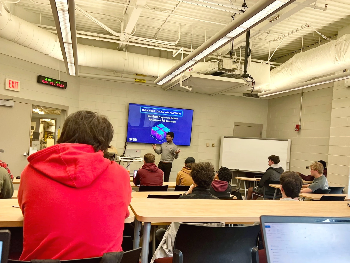
I am a doctoral candidate in Civil Engineering at Virginia Tech, where my work focuses on equipping the future workforce to drive innovation using sensor data analytics. My research looks into making advanced computational tools accessible to construction students and professionals who may not have a computer science background. My research centers around designing user-friendly, data-driven interfaces for construction sensor analytics, where I integrate UX techniques with bio-behavioral measurements, alongside machine learning, to enhance usability among end-users. I have a master's in Construction Management from East Carolina University and bachelors in Civil Engineering from Ahsanullah University of Science and Technology. Additionally, I bring a wealth of industry experience from working as a project engineer on large-scale international construction projects, where I managed technical supervision, design coordination, and construction management.
If I were not in graduate school, I would be working in the construction industry, likely taking on a project management role. I would thrive on collaborating with a diverse team of construction workers daily, coordinating efforts to ensure projects progress on time and within budget. The dynamic nature of on-site work and the responsibility of managing various construction operations would keep me highly motivated and engaged.
Balancing my PhD work with family life, personal interests, and other responsibilities is crucial but yet challenging. I am very intentional with my time and I prefer to set specific work hours to stay productive during research and coursework. This allows me to be fully present with my family afterward. I also make time for my interests in gaming and music, which are great for unwinding and revamping my creativity.
What surprised me most about graduate school is the high level of independence it demands, particularly in graduate research. I was similarly surprised to find such a supportive community of peers and mentors, which has been invaluable in helping me grow and stay motivated.
I developed a pedagogical framework that integrates AI, data science, and sensor data analytics to enhance construction education by making complex computing concepts more accessible to students without prior programming experience. Knowing that over 110 students across three U.S. construction programs have benefited from the tools and methodologies I have created, along with the potential of this work to influence the future of workforce development, makes it one of my most rewarding achievements.
If I could merge another discipline, it would be behavioral and social sciences. This integration would inform my research by providing deeper insights into how human behavior influences technology adoption and learning processes.
My past experiences, particularly my work as a project engineer in the construction industry significantly prepared me for graduate school. Leading diverse teams in high-pressure environments sharpened my problem-solving and communication skills, which are essential in academia. However, transitioning from an 8-to-5 industry job required me to adapt and develop new strategies to thrive in this rigorous academic environment.
I expect that earning my advanced degree will enable me to drive meaningful change in the persistent inefficiencies and safety risks that have long affected the construction industry. This degree will empower me to emerge as a more influential leader, allowing me to advocate for innovative practices and advance workforce development effectively.
Managing the heavy workload to strike a balance between personal and academic obligations is one of the biggest struggles graduate students have. Stress and burnout result from this frequently. To overcome, I place a high value on efficient time management and a regimen that consists of specific times for work, family time, and self-care.
The last book I read strictly for pleasure was "The Godfather" by Mario Puzo. I finished it about two months ago. It's a fascinating glimpse into the world of organized crime and family loyalty.
Absolutely, social networking with graduate students in non-related fields holds significant value. Interacting with colleagues in other fields can promote multidisciplinary cooperation, generate fresh ideas, and offer new angles on problem-solving. It further fosters personal development since exchanging experiences and difficulties can build support systems that strengthen resiliency and flexibility in the face of academic demands. Eventually, developing a large network might benefit a student's academic route and lead to unforeseen options for research and career paths.